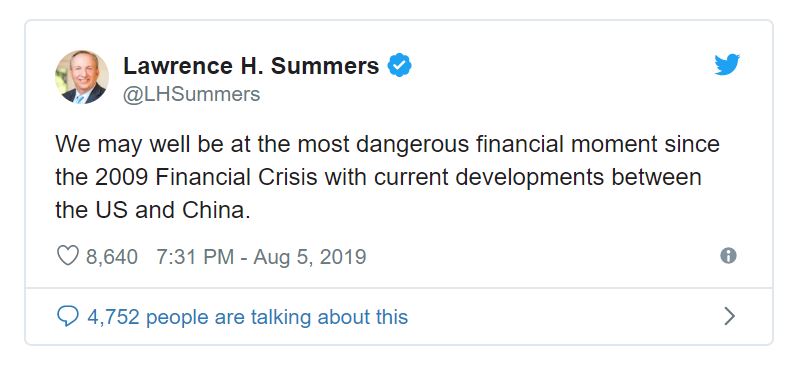For the most part, economists aren’t prone to hyperbole. Even in the midst of the historic financial collapse of 2008, they managed to speak in measured tones. Yet, there were several dire warnings this week about the economic dangers posed by President Donald Trump’s ramped-up trade war with China.
After Trump announced in a tweet last week he was boosting tariffs on an additional $300 billion of Chinese goods, essentially hitting everything coming from the world’s second-largest economy, China retaliated by letting its currency fall and instructing state-controlled buyers to stop all purchases of U.S. agricultural goods. Trump responded by labelling China a "currency manipulator," a move guaranteed to send tensions between the world's two largest economies through the roof.
“On a scale of 1-10, it’s an 11,” Cowen Managing Director Chris Krueger said in a note to investors Monday, describing the economic ramifications.
Stocks plunged on Monday, posting their biggest losses of 2019 as investors moved money into the bond market, a strategy known as a “flight to safety.” More competition for bonds causes investors to accept lower returns, which results in cheaper mortgage rates. The average U.S. rate for a 30-year fixed mortgage was 3.77% on Tuesday, down almost a tenth of a percentage point from a week earlier, according to Bankrate’s measure.
But, mortgage rates aren’t the only thing that drives the housing market. You can’t get a mortgage if you don’t have a job, Lawrence Yun, chief economist of the National Association of Realtors, pointed out.
“Mortgage rates this week will reach fresh lows, but for the wrong reasons,” Yun said. “If there is a job-cutting recession, which often occurs with delayed lag after a stock market correction, then low interest rates will not help home sales nor home prices.”
Another dire warning came from Lawrence Summers, who headed the White House’s National Economic Council during 2009 and 2010 as the nation’s leaders were trying to keep the economy from tumbling into a depression. Summers also was U.S. Treasury secretary under President Bill Clinton and is the former president of Harvard University.
Summers tweeted on Monday evening:
“We may well be at the most dangerous financial moment since the 2009 Financial Crisis with current developments between the US and China.”




